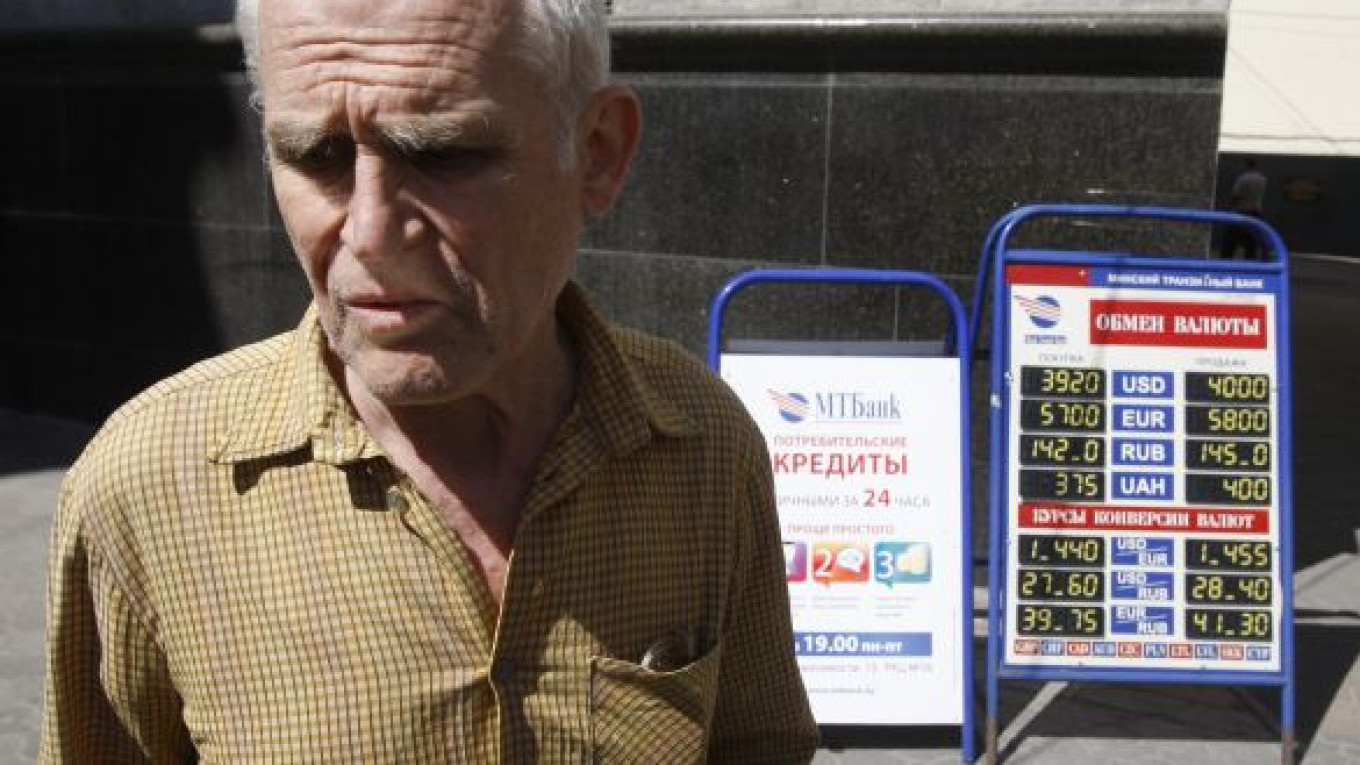Russia refused to provide a bailout loan to Belarus on Wednesday, telling it to privatize state assets and seek help from the International Monetary Fund, which in turn urged it to speed through reforms to overcome a currency crisis.
The Russian snub came despite Belarus' decision on Wednesday to ease restrictions on the foreign currency exchange rate, which Moscow had asked for, and raise the central bank's refinancing rate by 100 basis points.
Belarus had hoped to get a total of $3 billion from Moscow and a regional fund to which Russia is the main contributor after losing a quarter of its reserves this year trying to support the weakening Belarussian ruble.
But Finance Minister Alexei Kudrin said all Belarus could get this year was $1 billion from the Eurasian Economic Community Anti-Crisis Fund.
"We're considering a $1 billion loan [from the fund] this year," he told reporters in Moscow. "We think that these funds — if they are approved — will not be enough [to resolve the crisis in Belarus], and thus we think it would make sense [for Belarus] to turn to the IMF."
The currency crisis, which many analysts attribute to pre-election overspending by President Alexander Lukashenko last year, has led to crowds at street exchange points as Belarussians line up, sometimes through the night, to snap up the few available dollars.
Many imported goods, such as medicines, are now in short supply and people are buying up and hoarding staples, such as sugar and vegetable oil.
Formal devaluation of the Belarussian ruble could now be on the cards, which would erode people's savings and undermine Lukashenko's election pledges to raise living standards and could threaten the economic basis of his rule.
But Kudrin's advice to turn to the IMF for help may be hard to follow for Lukashenko.
He is under sanctions by Western governments because of his re-election in December that international monitors questioned. Analysts say the United States and the European Union could block any IMF aid even if Belarus applied for it.
The IMF on Wednesday welcomed Minsk's decision to liberalize the cash exchange rate but urged it to press ahead with "the unification of exchange rates on all segments of the foreign exchange market." Natalya Kolyadina, the IMF representative in Minsk, said Belarus had not applied for a loan.
Kudrin said the terms of the deal with Moscow would likely be agreed by May 19 when Prime Minister Vladimir Putin is due to visit Belarus.
Belarus could also raise $2 billion through privatization, he said.
"De facto, Russia cut its support by two-thirds relative to the initial plan," BNP Paribas economist Yulia Tseplyayeva said in a research note.
Kudrin's statement made it clear that Belarus would not get a quick cash injection that would allow its central bank to steady the exchange rate. The proposed Anti-Crisis Fund loan package would total $3 billion, but be spread over three years.
"I would say that the Russian position is justified because if it lends $1 billion to $2 billion to Belarus it would be a waste of money. Unless such a loan is accompanied by very strong policy conditions it would be wasted on [supporting] the currency," said Alexander Morozov, chief economist at HSBC in Moscow. "This tougher position is better for Belarus because it forces them to move forward."
Earlier Wednesday, Belarus said it has allowed retail exchange points to use market exchange rates rather than the official rate, a move that could once again allow ordinary Belarussians to buy foreign currency legally.
Exchange points in Minsk, however, remained short of foreign currency as, according to a market source, the central bank instructed them to adjust the exchange rate gradually. Most exchange points quoted the ruble at about 4,000 per dollar.
The official exchange rate, which has stayed at around 3,000 rubles per dollar, now applies only to exporters' mandatory sales of foreign currency — which the central bank then resells at similar rates to key importers.
Other companies use a free-floating rate that is hovering at about 5,000 rubles per dollar.
The central bank also said it would raise its refinancing rate to 14 percent from 13 percent from May 18 as inflation accelerated to 18.1 percent year on year in April.
Lukashenko won a fourth term in office last December in a vote tarnished by a police crackdown on hundreds of opposition supporters. The crackdown led to the Western sanctions that include a travel ban on Lukashenko and his associates.
"It would be a huge fillip for markets if they got a fund program," said Gabriel Sterne, at Exotix brokerage in London. "But Lukashenko has clearly turned against the West again."
This leaves Moscow in a position of power even despite its refusal to fully bail out Minsk. "It's fair to say Russia has never been in a stronger position to get serious concessions from Lukashenko," Sterne said.
A Message from The Moscow Times:
Dear readers,
We are facing unprecedented challenges. Russia's Prosecutor General's Office has designated The Moscow Times as an "undesirable" organization, criminalizing our work and putting our staff at risk of prosecution. This follows our earlier unjust labeling as a "foreign agent."
These actions are direct attempts to silence independent journalism in Russia. The authorities claim our work "discredits the decisions of the Russian leadership." We see things differently: we strive to provide accurate, unbiased reporting on Russia.
We, the journalists of The Moscow Times, refuse to be silenced. But to continue our work, we need your help.
Your support, no matter how small, makes a world of difference. If you can, please support us monthly starting from just $2. It's quick to set up, and every contribution makes a significant impact.
By supporting The Moscow Times, you're defending open, independent journalism in the face of repression. Thank you for standing with us.
Remind me later.


